Hãy nhập câu hỏi của bạn vào đây, nếu là tài khoản VIP, bạn sẽ được ưu tiên trả lời.

d: Ta có: \(\dfrac{x}{x+3}-\dfrac{2x}{x-3}-\dfrac{3x}{9-x^2}=0\)
\(\Leftrightarrow x^2-3x-2x^2-6x+3x=0\)
\(\Leftrightarrow-x^2-6x=0\)
\(\Leftrightarrow-x\left(x+6\right)=0\)
\(\Leftrightarrow\left[{}\begin{matrix}x=0\left(nhận\right)\\x=-6\left(nhận\right)\end{matrix}\right.\)

a: Ta có: \(3x-\left(3x+2\right)=x+3\)
\(\Leftrightarrow x+3=-2\)
hay x=-5
b: Ta có: \(\dfrac{5x-1}{4}+\dfrac{2x-1}{3}=\dfrac{3x}{2}\)
\(\Leftrightarrow15x-3+8x-4=18x\)
\(\Leftrightarrow5x=7\)
hay \(x=\dfrac{7}{5}\)

a: Ta có: \(4x-2\left(1-x\right)=5\left(x-4\right)\)
\(\Leftrightarrow4x-2+2x=5x-20\)
\(\Leftrightarrow x=-18\)
b: Ta có: \(\dfrac{x}{6}+\dfrac{1-3x}{9}=\dfrac{-x+1}{12}\)
\(\Leftrightarrow6x+4\left(1-3x\right)=3\left(-x+1\right)\)
\(\Leftrightarrow6x+4-12x=-3x+3\)
\(\Leftrightarrow-3x=-1\)
hay \(x=\dfrac{1}{3}\)
c: Ta có: \(\left(x+2\right)^2-3\left(x+2\right)=0\)
\(\Leftrightarrow\left(x+2\right)\left(x-1\right)=0\)
\(\Leftrightarrow\left[{}\begin{matrix}x=-2\\x=1\end{matrix}\right.\)

\(a,3x^2+2x-1\Leftrightarrow3x^2-x+3x-1\Leftrightarrow x\left(3x-1\right)+\left(3x-1\right)\Leftrightarrow\left(3x-1\right)\left(x-1\right)\)

a) 0,25x+1,5=0
=> x = (0 - 1,5) : 0,25 = -1,5 : 0,25 = -6
Vậy x = -6.
b) 6,36−5,3x=0
=> x = (0 + 6,36) : 5,3 = 6,36 : 5,3 =\(\dfrac{6}{5}=1,2\)
Vậy x = 1,2.
c) 43x−56=12
=> x = \(\left(\dfrac{1}{2}+\dfrac{5}{6}\right)\): \(\dfrac{4}{3}\) = \(\dfrac{4}{3}:\dfrac{4}{3}=1\)
Vậy x = 1.
d) −59x+1=23x−10
=> \(\dfrac{-5}{9}x-\dfrac{2}{3}x=\dfrac{-11}{9}x=-10-1=-11\)
=> \(x=-11:\dfrac{-11}{9}=9\)
Vậy x = 9.

a) \(\dfrac{4x-17}{2x^2+1}=0\) ( 1)
ĐKXĐ : \(2x^2+1\ne0\)
⇔ x2 \(\ne\dfrac{-1}{2}\) ( luôn đúng )
( 1) ⇔ 4x - 17 = 0
⇔ x = \(\dfrac{17}{4}\)
KL....
b) \(\dfrac{4}{x-2}-x+2=0\)
⇔ \(\dfrac{4-\left(x-2\right)^2}{x-2}=0\left(x\ne2\right)\)
⇔ 4 - ( x2 - 4x + 4) = 0
⇔ 4x - x2 = 0
⇔ x( 4 - x) = 0
⇔ x = 0 ( TM) hoặc x = 4 ( TM)
KL...
c) x + \(\dfrac{1}{x}=x^2+\dfrac{1}{x^2}\left(x\ne0\right)\)
Đặt : x + \(\dfrac{1}{x}=t\) ⇒ \(x^2+\dfrac{1}{x^2}=t-2\) , ta có :
t = t - 2 ( Vô lý )
⇒ t ∈ ∅
⇒ Phương trình vô nghiệm
d) \(\dfrac{x-3}{x-2}-\dfrac{x-2}{x-4}=3\dfrac{1}{5}\left(x\ne2;x\ne4\right)\)
⇔ ( x - 3)( x - 4) - ( x - 2)2 = \(\dfrac{16}{5}\)( x - 2)( x - 4)
⇔ x2 - 7x + 12 - x2 + 4x - 4 = \(\dfrac{16}{5}\)( x2 - 6x + 8)
⇔ \(\dfrac{40-15x}{5}=\dfrac{16x^2-96x+128}{5}\)
giải nốt nha

a) ĐKXĐ: \(x\ne0\)
Ta có: \(\dfrac{3x^2+7x-10}{x}=0\)
Suy ra: \(3x^2+7x-10=0\)
\(\Leftrightarrow3x^2-3x+10x-10=0\)
\(\Leftrightarrow3x\left(x-1\right)+10\left(x-1\right)=0\)
\(\Leftrightarrow\left(x-1\right)\left(3x+10\right)=0\)
\(\Leftrightarrow\left[{}\begin{matrix}x-1=0\\3x+10=0\end{matrix}\right.\Leftrightarrow\left[{}\begin{matrix}x=1\\3x=-10\end{matrix}\right.\Leftrightarrow\left[{}\begin{matrix}x=1\\x=-\dfrac{10}{3}\end{matrix}\right.\)
Vậy: \(S=\left\{1;-\dfrac{10}{3}\right\}\)
a/ \(\dfrac{3x^2+7x-10}{x}=0\)
\(< =>3x^2+7x-10=0\)
\(< =>3x^2+10x-3x-10=0\)
\(< =>\left(3x^2+10x\right)-\left(3x+10\right)=0\)
\(< =>x\left(3x+10\right)-\left(3x+10\right)=0\)
\(< =>\left(3x+10\right)\left(x-1\right)=0\)
\(=>\left\{{}\begin{matrix}3x+10=0=>x=-\dfrac{10}{3}\\x-1=0=>x=1\end{matrix}\right.\)
Vậy tập nghiệm của .....

a)\(x\in R\)
b)\(x\ne1\)
c) \(x\notin\left\{1;2\right\}\)
d) \(x\notin\left\{3;-3\right\}\)
e) \(x\ne1\)
f) \(x\notin\left\{2;3\right\}\)
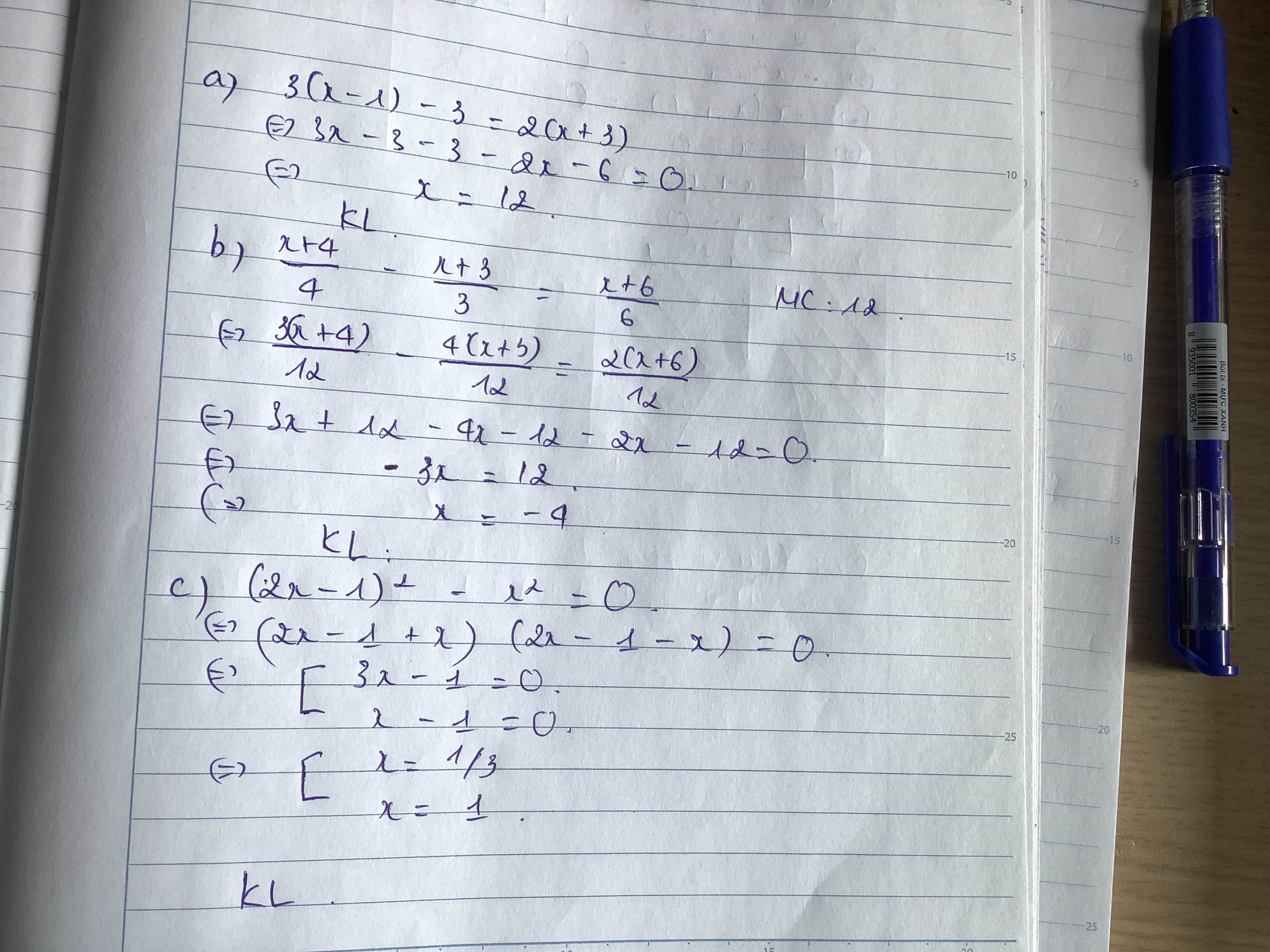
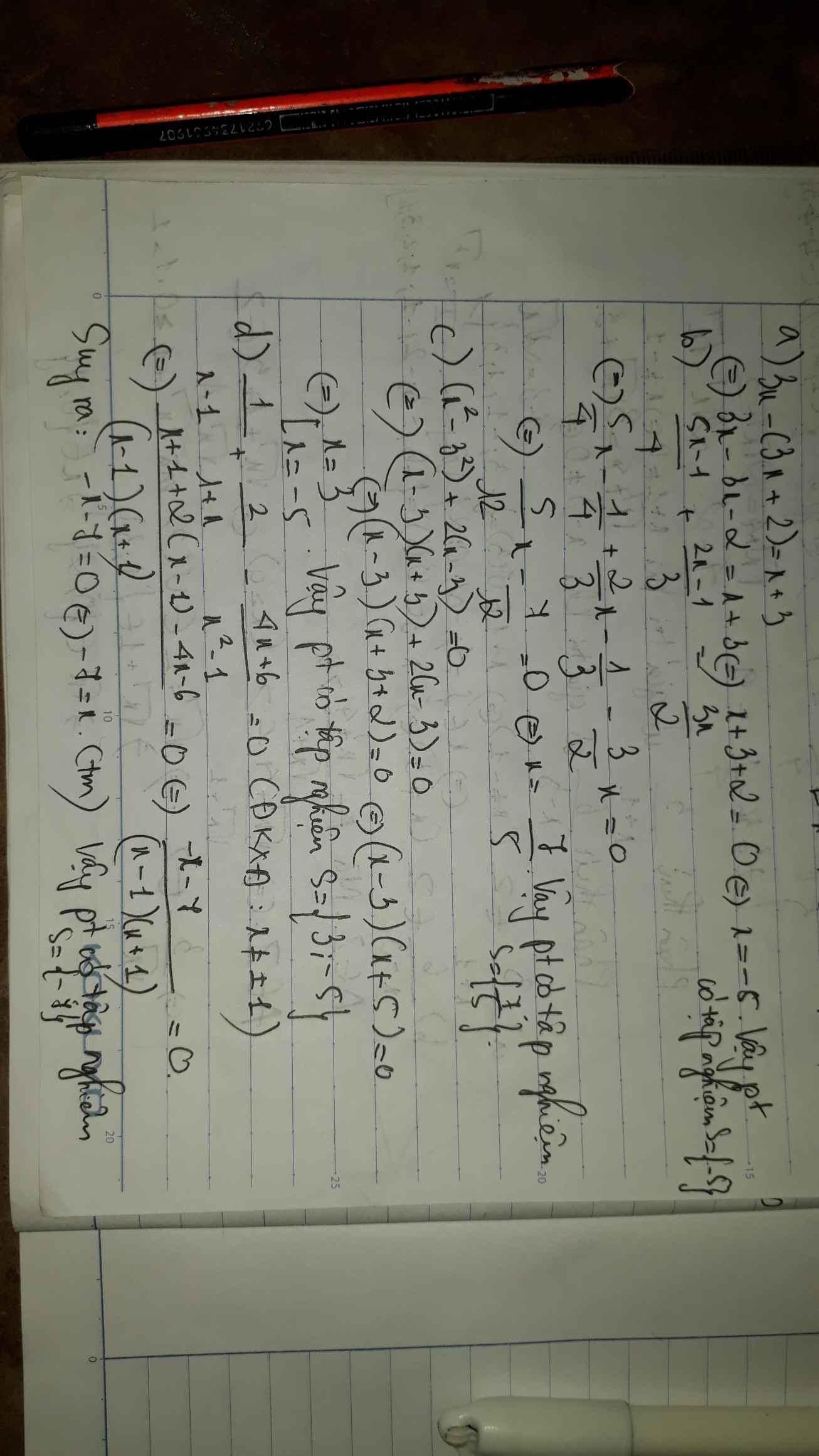
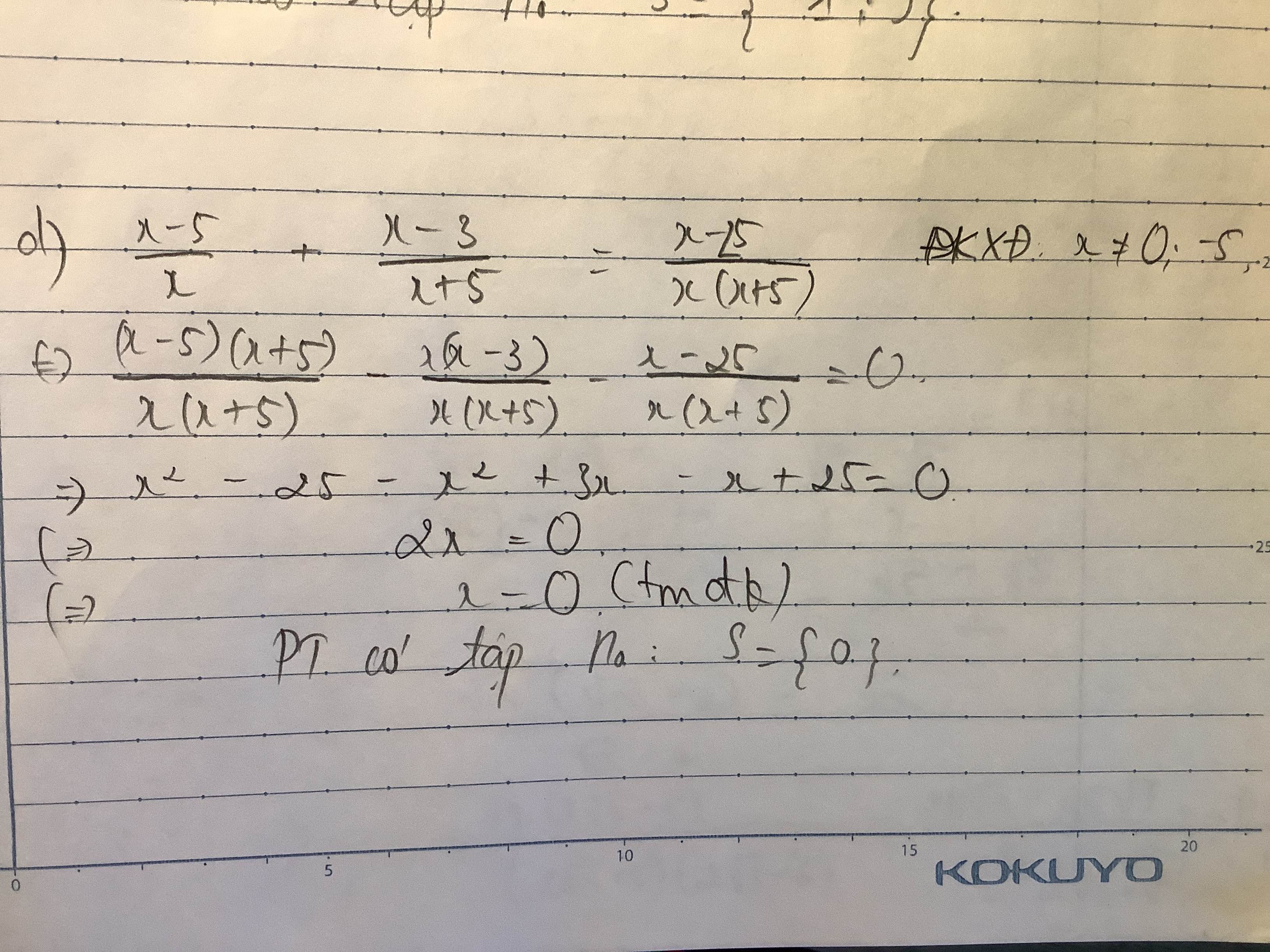
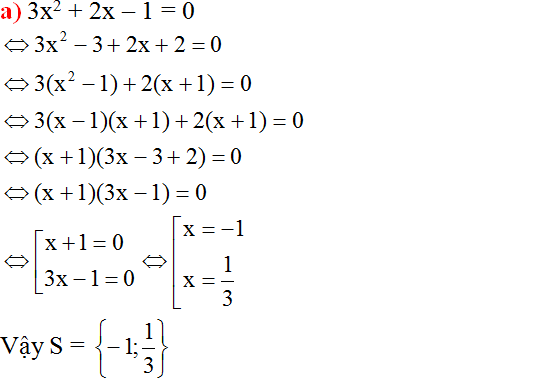
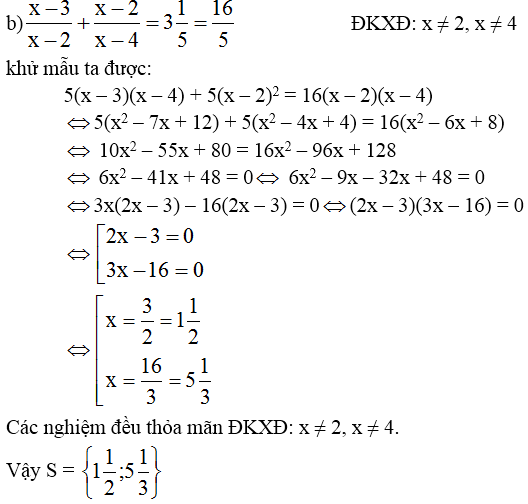
a) \(\dfrac{2}{3}x + 1\dfrac{1}{2} = 0\)
\(\dfrac{2}{3}x + \dfrac{3}{2} = 0\)
\(\dfrac{2}{3}x = 0 - \dfrac{3}{2}\) (quy tắc chuyển vế)
\(\dfrac{2}{3}x = \dfrac{{ - 3}}{2}\)
\(x = \dfrac{{ - 3}}{2}:\dfrac{2}{3}\) (quy tắc chia cho một số)
\(x = \dfrac{{ - 9}}{4}\)
Vậy phương trình có nghiệm \(x = \dfrac{{ - 9}}{4}\).
b) \(2\dfrac{1}{2} - 0,75x = 0\)
\(\dfrac{5}{2} - 0,75x = 0\)
\( - 0,75x = 0 - \dfrac{5}{2}\) (quy tắc chuyển vế)
\( - 0,75x = - \dfrac{5}{2}\)
\(x = \left( { - \dfrac{5}{2}} \right):\left( { - 0,75} \right)\) (quy tắc chia cho một số)
\(x = \dfrac{{10}}{3}\)
Vậy phương trình có nghiệm \(x = \dfrac{{10}}{3}\).